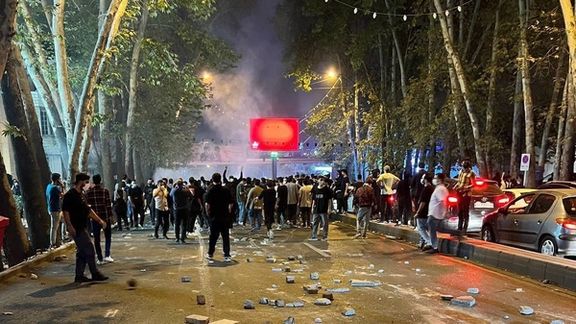France Says EU To Impose Sanctions On Iranian Officials

France's foreign minister said Tuesday that the European Union was looking to impose sanctions on several Iranian officials involved in the crackdown on protesters.
"France's action at heart of EU ... (is) to target those responsible for the crackdown by holding them responsible for their acts," Catherine Colonna told lawmakers in parliament, adding that the EU was looking at asset freezes and travel bans.
The bloc last agreed human rights sanctions on Tehran in 2021. No Iranians had been added to that list since 2013, however, as the bloc has shied away such measures in the hope of reviving a nuclear accord with Iran after the United States withdrew in 2018. Those talks have now stalled.
It currently has an array of sanctions on about 90 Iranian individuals which have been renewed annually every April.
Colonna suggested the new measures could target repressive regime figures who send their children to live in Western countries. Diplomats say the measures are expected to be rubber-stamped at an EU foreign ministers meeting on October 17.
The United States and Canada have already imposed sanctions on Iran's morality police over allegations of abuse of Iranian women, saying they held the unit responsible for the death of a 22-year-old Mahsa Amini in police custody.
President Joe Biden issued a statement on Mondaysaying he is “gravely concerned about reports of the intensifying violent crackdown on peaceful protestors in Iran, including students and women, who are demanding their equal rights and basic human dignity.” He added that Washington will impose more sanctions this week on certain Iranian officials.
Amini, a Kurdish woman, was arrested by the morality police in Tehran for wearing "unsuitable attire" and fell into a coma while in detention. The authorities have said they would investigate the cause of her death, but so far, no police officer has been named, held responsible or arrested.
CT scans obtained by Iran International showed that Amini received hard blows to her head causing a fracture to her skull and brain damage. Hospital staff told us that she had no hope of being revived when she was brought in on September 13. She died three days later September 16.
Her death triggered nationwide protests that quickly turned into anti-regime unrest with mostly young protesters calling for an end to the Islamic Republic, freedom for women and equality.
Iran's Supreme Leader Ali Khamenei on Monday gave his full backing to security forces confronting protests ignited by the death of Amini, comments that could herald a harsher crackdown to quell unrest more than two weeks since she died.
Protesters have been chanting “Death to Khamenei” and “Death to the dictator” ever since demonstrations began.
He blamed the United States and Israel for “planning” the protests and claimed Iranian people did not initiate the unrest. Iran often blames “enemies” for similar incidents.
Iran Human Rights, a Norway-based group, has said nearly 150 people have been killed. Iranian authorities have not given a death toll, while saying many members of the security forces have been killed by "rioters and thugs backed by foreign foes".
Around 50 people were gunned down by security forces just in the Sunni Baluch populated region of southeast Iran near Pakistan since Friday according to local sources.
With reporting by Reuters